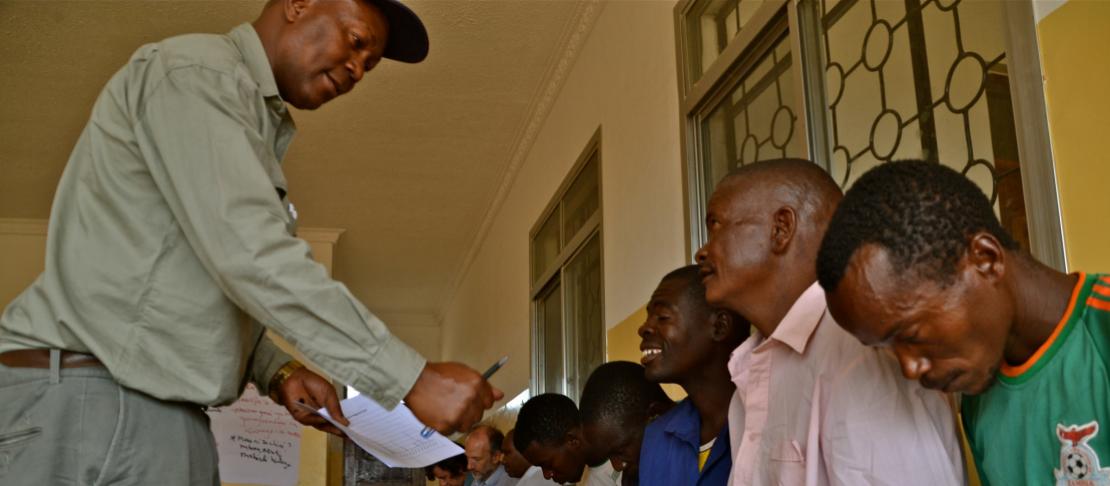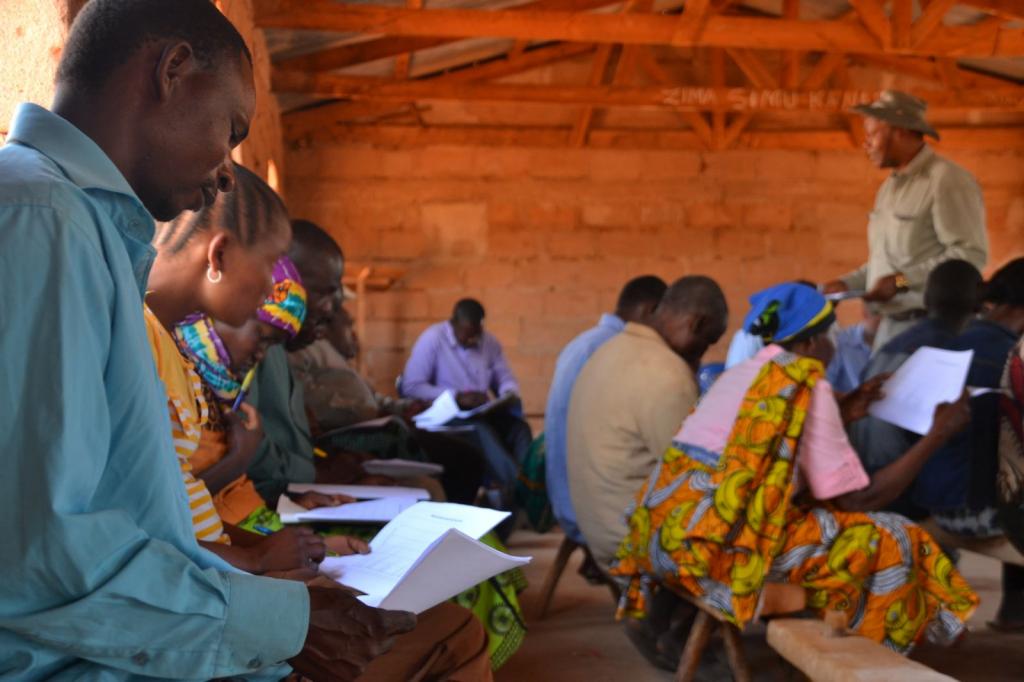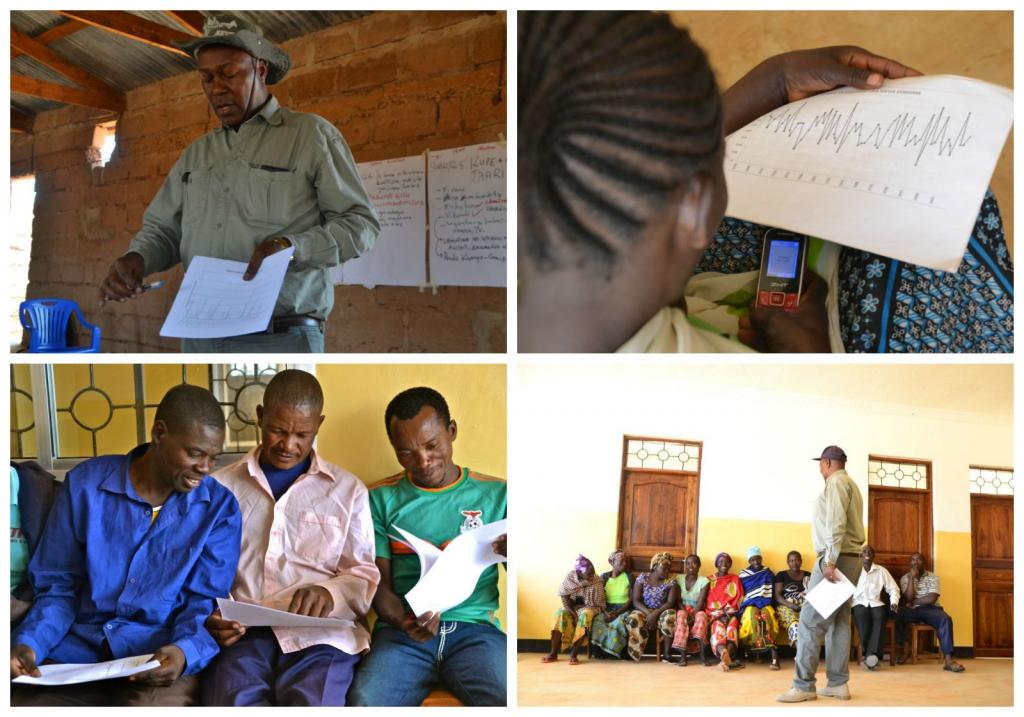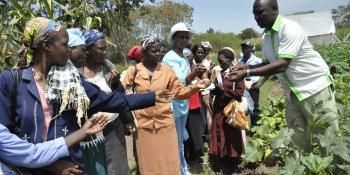How 'training-of-trainers' reach farmers with participatory climate information services

Project advances the delivery of climate information services to farmers through ‘training-of-trainers’.
The development and delivery of climate information services in developing countries has so far been a slow and unfocused process. A number of factors prevent climate services from supporting farmers in their decision-making, especially at the large-scale.
One of these factors relates to the limited capacity of meteorological agencies to produce and distribute locally relevant information that farmers actually need.
Another factor is that agricultural institutions are missing the tools and trained staff to communicate complex climate information in an understandable way.
With the ambition to change this, the Walker Institute at the University of Reading and the CGIAR Research Program on Climate Change, Agriculture and Food Security (CCAFS) are collaborating to develop ways to disseminate local climate service information by training communicators, or intermediaries.
Via these climate communicators, the project hopes farmers will be able to get involved to both co-produce and make better use of local climate information that can support their farming.

Climate intermediaries like Elirehema Swai from the Agricultural Research Institute Tanzania, seen in the back of this picture, play a key role in spreading information about climate advisories. Photo by C. Schubert (CCAFS)
Reaching farmers through climate intermediaries
This is how a number of “Training of Trainers” sessions came about this summer. About 80 intermediaries from the Balaka, Nsanje and Lilongwe districts in Malawi came together in Liwonde to be trained on the Participatory Integrated Climate Services for Agriculture (PICSA) approach.
The PICSA approach uses locally relevant climate information and participatory decision-making tools to enable small-scale farmers to improve their resilience in the face of erratic rainfall and increasing temperatures.
This is a part of a larger effort undertaken by the World Food Programme (WFP) and CCAFS to identify gaps in existing climate and agriculture information delivery systems, which has led to advancements of useful information and communications technologies (ICTs) to bring relevant and useful advisories directly to farmers.
WFP has large programs with national extension services and other stakeholders to support coordinated development interventions in target districts. The training of extension staff in PICSA compliments this.
The training workshops were organised jointly by CCAFS and the WFP as part of the Global Framework for Climate Services (GFCS) Adaptation Program in Africa and the Department of Climate Change and Metrological Services (DCCMS) in Malawi. Participants came from the Ministry of Agriculture and Concern Universal in the Balaka District, the Malawi Red Cross from Nsanje and Lilongwe Districts, as well as one participant from Farm Radio Trust in Lilongwe.
The 'training-of-trainers' activities are carried out under the PICSA work and particularly target intermediaries who are already working with farmers, such as agriculture extension agents. These agents have the experience and commitment from which the project hopes to learn and which it seeks to incorporate into in its activities.
The training also include radio broadcasters, who can enable the team to get agriculture information out to thousands of people on a regular basis. Using existing local networks and information channels, makes it much easier for information to trickle down to the farming communities.

PICSA work in pictures. View more photos from Ikowa and Makoja, Tanzania.
Scaling out climate services with PICSA
In using the specifically developed tools and methods within the PICSA approach, intermediaries can support farmers as they draw up plans for their future livelihoods. This can include choosing between new crops and livestock, or alternate livelihood options suited to farmers’ own circumstances and a changing climate. Farmers are also given seasonal and short-term forecasts before the season starts to help either revise or implement their plans.
The training in Liwonde included a field activity in the Balaka district in which together with farmers, participants used the outlined PICSA tools including drawing resource maps, seasonal calendars and outlining participatory budgets, as well as calculating historical climate data to get probable seasonal rainfall totals and planting days for crops. The extension agents will now go on and work with thousands of farmers by targeting 2,500 households in the various Malawi districts for a more food-secure future.
Related reading
- The GFCS Adaptation Program in Africa is supported by a number of donors and partners. Visit the project page to learn more.
- Learn more about the PICSA work on either CCAFS project page, or on Walker Institute's research page
- Blog: Farmers need climate information services they can use
- Blog: Strengthening availability and use of climate services in Africa
This blog was based on material provided by Alic Kafasalire (CCAFS/CIAT) who is based in Malawi, Jim Hansen, Flagship Leader CCAFS Flagship on Climate Risk Management, and Peter Dorward, leader of the PICSA work at Walker Institute, Reading University. All photos by Cecilia Schubert (CCAFS).



